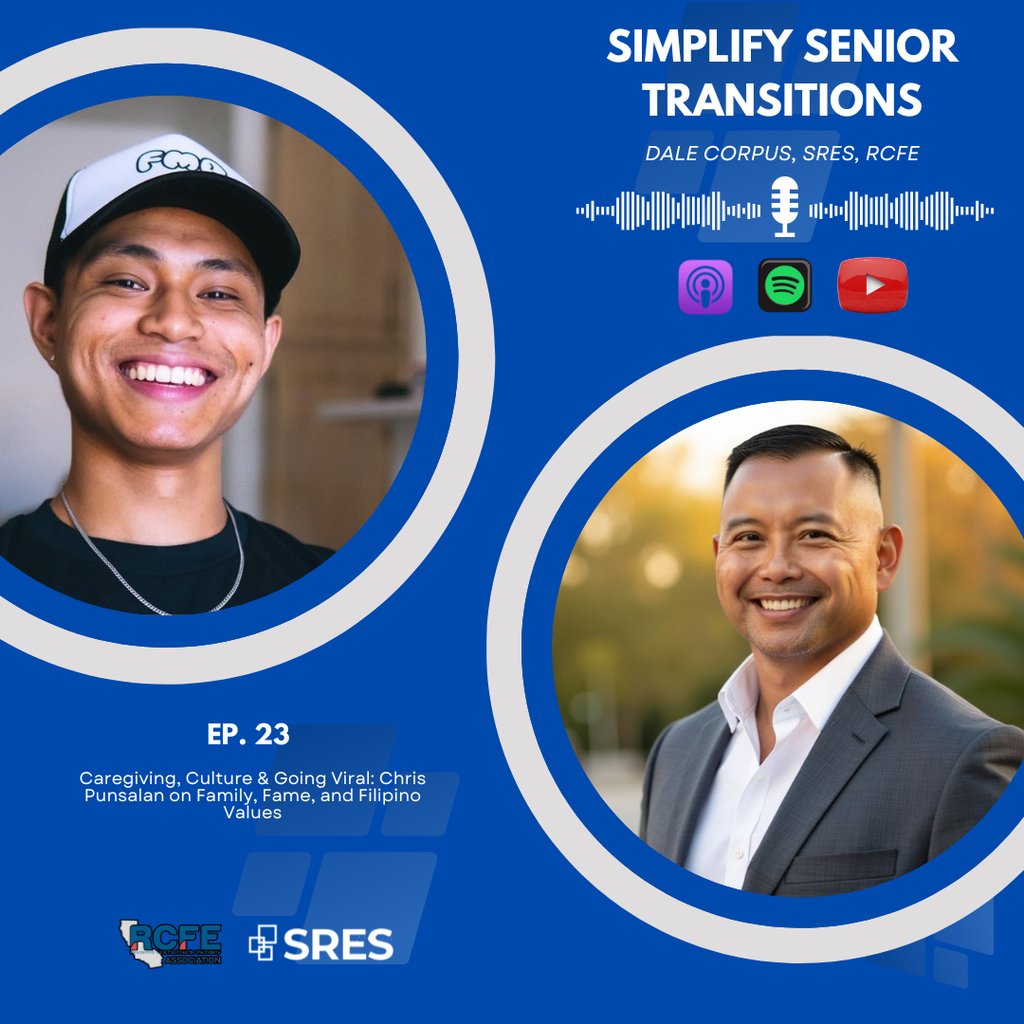The Viral Caregiver: Chris Punsalan on Love, Loss, and the Reality of Full-Time Care
What eight years caring for his Lola taught him about sacrifice, legacy, and why asking for help is the ultimate act of love.
Dale Corpus
5/26/20254 min read
Navigating the Journey of Helping Aging Parents Transition
Navigating the journey of helping aging parents transition can feel like a monumental task, full of emotional ups and downs.
If you're an adult child in the San Francisco Bay Area—especially in counties like Contra Costa, Alameda, Santa Clara, San Mateo, San Francisco, Solano, or Napa—juggling work, family, and the complex needs of your elders, you're not alone.
The Simplify Senior Transitions podcast, hosted by senior transition specialist Dale Corpus, aims to bring clarity and support to this challenging period.
Chris Punsalan: A Caregiver’s Journey
In a recent historic episode, Dale welcomed Chris Punsalan, a caregiver creator and advocate, whose powerful online community has shined a light on family caregiving, particularly within the Filipino American experience.
Chris’s viral videos, documenting daily life with his grandmother (Lola), offer invaluable insights into the realities, challenges, and profound joys of this role. His story resonates deeply, offering a candid look at decision-making, the emotional toll, and the surprising blessings that come with caring for a loved one.
Here's what you'll learn in this episode:
The deep-rooted cultural influence on caregiving, especially within Filipino American families, where caring for elders is a natural progression of love and responsibility.
The day-to-day realities and often mundane yet packed schedule of full-time caregiving, from personal hygiene to meal preparation.
The tough decisions families face regarding care options, weighing in-home care against assisted living facilities, and understanding that there’s no single “right” answer for everyone.
Strategies for managing the emotional stress of caregiving, including the importance of setting boundaries, changing your perspective on personal freedom, and processing anticipatory grief.
The vital role of support systems and self-care, highlighting why asking for help is not a sign of weakness but an essential act of love for both caregiver and loved one.
Navigating life after caregiving, rediscovering purpose, and continuing to honor a loved one’s legacy while adapting to a new season of life.
The power of community and advocacy for caregivers, emphasizing the importance of shared experiences and connecting with resources.
Chris's Journey: A Story of Unwavering Love and Dedication
Chris’s bond with his Lola was special because she raised him—a common story for many Filipino American grandmothers who cared for grandchildren while parents worked.
When his grandmother suddenly became unable to get out of bed due to arthritis, Chris instinctively stepped into the role of her full-time caregiver. He was just finishing college and had no immediate job opportunities lined up. This wasn’t about repaying her; it was the natural progression of love for someone who had cared for him.
His daily routine was packed and often mundane—assisting with bathroom use, cleaning, transfers to a wheelchair, and meal preparation (three to four times a day), with a thorough “everything shower” on Fridays. This routine lasted for eight years, during which he bonded with his grandmother in an unforgettable way.
At just 21, Chris had to give up spontaneous outings, travel, and job opportunities to be at home 24/7, six days a week. Yet, he learned to see this role as a blessing. He surprised himself with how quickly he adapted to intimate personal tasks, feeling that no one else could care for his grandmother the way he did.
While it was primarily Chris and his mother providing daily care, other family members stepped in on weekends, offering them much-needed breaks.
His cultural upbringing as a Filipino American deeply influenced his decision to care for his Lola. At first, he didn’t realize this was unique to his culture—it felt so ingrained. Over time, he understood it also aligned with a spiritual calling. His faith became pivotal, especially during hard moments and in his grandmother’s final 72 hours in the hospital, which brought him peace after her passing.
Navigating Life After Caregiving
When his grandmother passed, Chris experienced a mix of emotions—lost, relieved, and heartbroken.
He describes grief as non-linear and highlights his experience with anticipatory grief for eight years, constantly pondering her mortality. This meant her passing wasn’t a sudden shock but the culmination of a long grieving process, leading to a different emotional response than others might expect.
Rediscovering purpose post-caregiving has involved trying many new opportunities, especially those adjacent to caregiving, such as speaking on podcasts. This hands-on approach has given him clarity, reaffirming his role in the caregiving space.
Chris also attributes much of his success in online business and music to the discipline and routines developed during his caregiving years. Today, he sees himself as a caregiving advocate, building community, sharing experiences, and connecting people with vital resources like elder law attorneys and estate planners.
Crucial Advice for Current and Future Caregivers
Chris offers powerful advice, especially for those in the thick of caregiving or facing the decision to become a caregiver:
It’s okay to consider care facilities if that’s the best option for your loved one’s needs. Everyone’s situation is different, and there should be no shame in this decision.
You have permission to ask for help. This is perhaps his most critical message. Whether it’s asking a friend or family member for respite care, or exploring temporary facilities, taking breaks allows you to recharge and continue providing care at 100%. It’s an act of love, not giving up.
Seek local resources and specialists. Awareness is the first step, followed by professional guidance for conditions like dementia or Alzheimer’s.
If you feel invisible, you are not alone. Chris himself felt this, even with a large online community. Finding other caregivers, even online, provides community and validation.
Caregiving is a full-time job. It’s physically and emotionally taxing, and caregivers are severely underpaid. More support is needed for those balancing caregiving with other responsibilities.
Chris’s story is a reminder that caregiving is a profound act of legacy, resilience, and deep human connection.
Ready to Take the Next Step?
If your loved one is considering senior living, or if you need to figure out what to do with their home—from downsizing to selling—let’s talk. You don’t have to navigate this complex journey alone.
📞 Schedule a FREE consultation at www.simplifyseniortransitions.com to learn more about Dale Corpus’s services in senior living real estate.
🎧 Listen to the full episode of the Simplify Senior Transitions podcast for more detailed insights from Chris.
📲 Connect with Dale directly via Instagram @soldbydale.
P.S. Got news or an amazing story to share? Email us at dale.corpus@exprealty.com and you might be featured in our next episode!
Happy listening!
Would you like me to also create SEO tags with commas for this blog (like we did for the others), or keep it as-is?
Watch The Podcast Here



Transitions Made Simple
Helping seniors transition with ease and peace.
📍 Serving the San Francisco Bay Area
📞 GET IN TOUCH
📬 STAY INFORMED
Dale Corpus, SRES, RCFE
📱 925-380-1657
📧 dale@simplifyseniortransitions.com
🕓 Available for free 15 min consultations by appointment
© 2026. All rights reserved.
Sign up for monthly senior transition tips & real estate insights.
